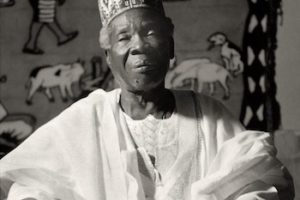
Babatunde Olatunji
*Babatunde Olatunji was born on this date in 1927. He was a Nigerian musician specializing in percussion.
Born and raised in Nigeria, Olatunji was educated at Morehouse College in Atlanta and the New York University Graduate School. At Morehouse, he began performing casually, entertaining students. As the demand for his music grew, he turned professional. In 1959, Columbia Records released Olatunji's first album, Drums of Passion, which became a worldwide hit. It was the first album to bring genuine African music to Western ears, selling over five million copies.
Olatunji traveled globally for forty years, spreading his music and African culture. 1973 he founded the Olatunji Center of African Culture in Harlem, NY. He also has been a faculty member at the Esalen Institute in Big Sur, California, and the Omega Institute in Rhinebeck, New York, for almost 15 years. At these institutions, as well as workshops and festivals, Olatunji pursued spreading knowledge of African culture. He taught traditional drumming, dancing, and chanting in classes for adults and young people. Olatunji received a Grammy Award in 1991 for collaborating with Grateful Dead drummer Mickey Hart on their Planet Drum album.
Also, his composition "Jingo Lo Ba" has become a signature song for the rock group Santana. Olatunji also has written scores for Broadway and Hollywood productions, including the music for She's Gotta Have It by Spike Lee. 1997 he released Love Drum Talk, nominated for the 1998 Grammy for Best World Music Album. Olatunji pioneered world music and influenced musicians such as Hart, Santana, John Coltrane, and Bob Dylan. He once said, "Rhythm is the soul of life. The whole universe revolves in rhythm. Everything and every human action revolve in rhythm." Babatunde Olatunji died on April 6, 2003, at a Salinas hospital of complications from diabetes.